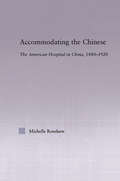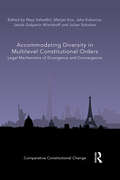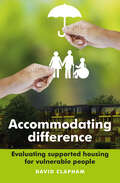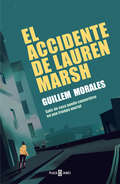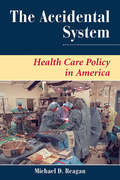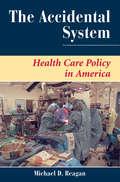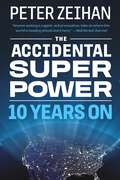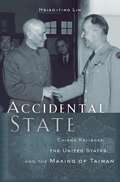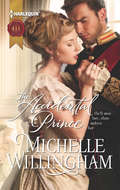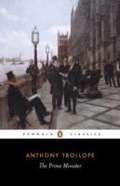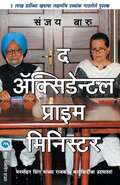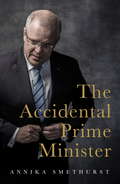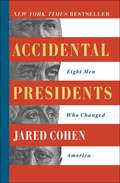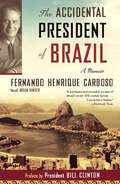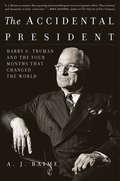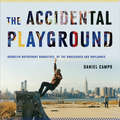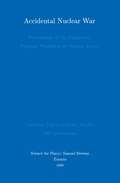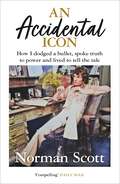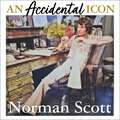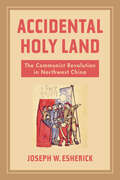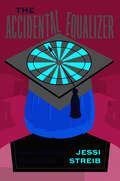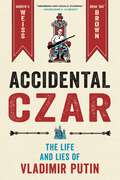- Table View
- List View
Accommodating the Chinese: The American Hospital in China, 1880-1920 (East Asia: History, Politics, Sociology and Culture)
by Michelle Campbell RenshawThis in-depth comparative study demonstrates that the hospital established in China - its planning and architecture, financing, and all aspects of day-to-day operation - differed from its counterpart at home. These differences were never due to a single, or even dominant cause. They were a result of a complex process involving accommodation, appreciation, negotiation, opportunism and pragmatism.
Accommodating Rising Powers
by Paul T. V.As the world enters the third decade of the twenty-first century, far-reaching changes are likely to occur. China, Russia, India, and Brazil, and perhaps others, are likely to emerge as contenders for global leadership roles. War as a system-changing mechanism is unimaginable, given that it would escalate into nuclear conflict and the destruction of the planet. It is therefore essential that policymakers in established as well as rising states devise strategies to allow transitions without resorting to war, but dominant theories of International Relations contend that major changes in the system are generally possible only through violent conflict. This volume asks whether peaceful accommodation of rising powers is possible in the changed international context, especially against the backdrop of intensified globalization. With the aid of historic cases, it argues that peaceful change is possible through effective long-term strategies on the part of both status quo and rising powers.
Accommodating Diversity in Multilevel Constitutional Orders: Legal Mechanisms of Divergence and Convergence (Comparative Constitutional Change)
by Maja Sahadžic Marjan Kos Jaka Kukavica Jakob Gašperin Wischhoff Julian ScholtesThis book offers insights into the legal mechanisms that are adopted in multilevel constitutional orders to accommodate the tension between contrasting interests of diversity and unity and the converging or diverging effects they may have on the functioning of a multilevel constitutional order. It does so by targeting mainly the European experience but also drawing insights from other jurisdictions. The volume draws on a well-rounded theoretical framework that allows a comprehensive discussion of the dialectics in multi-level systems.) It focuses on two of the most relevant areas of constitutional law, namely the setup of supranational institutions and the protection of fundamental human rights. Finally, the work presents a fresh legal take on the unity-diversity dichotomy. This collection is ideal for academics working in the fields of constitutional law, international law, federal theory, institutional design, management and accommodation of diversity, and protection of fundamental rights. Political scientists will also find the discussions very relevant as a foundation for further research in their field. Policymakers involved in constitutional engineering will be interested, as mechanisms of accommodation, convergence, and divergence are increasingly looked at as devices for managing multilevel polities.
Accommodating Difference: Evaluating Supported Housing for Vulnerable People
by David ClaphamFor vulnerable older, disabled or homeless people who need accommodation and support, many different forms of housing have developed – whether hostels, group homes, extra-care housing or retirement villages. But do these settings effectively improve the well-being of those who live in them? This important book explores the impact of different forms of policy and practice on the lives of vulnerable people, arguing for a flexible policy approach that places people in control of their own lives. It puts forward an original evaluation framework and applies this to case studies of provision in Britain and Sweden – two countries with long and differing experiences – to raise interesting and important issues for the future. The book will be a valuable resource for those working in and devising policy for supported housing as well as students on urban studies and planning courses and those studying health and social care subjects who wish to better understand the nature of supported housing.
El accidente de Lauren Marsh
by Guillem Morales«La gente suele correr para huir de un peligro. Lauren, en cambio, corría para caer en uno.» ¿Qué amenaza se cierne sobre los habitantes de la urbanización Century Europa? Lauren Marsh sale a correr, como cada mañana, y cae en un socavón mal señalizado en las obras de reforma de la urbanización Century Europa donde vive. Afortunadamente, la mujer no sufre heridas mortales, pero Cédric, el inspector de seguros encargado de la investigación, descubre indicios de que el accidente no ha sido fortuito. A partir de ese momento, se verán envueltos en una trama de misterio donde nada es lo que parece: sucesos sangrientos, vecinos que guardan secretos y una verdad oculta de la que es imposible salir indemne. Los accidentes en Century Europa no han hecho más que empezar... El accidente de Lauren Marsh, la primera novela del director de cine y guionista Guillem Morales, es una reflexión sobre la soledad, la culpa y el aislamiento en una gran ciudad, con la forma de un original y demoledor thriller de ritmo absorbente, trama retorcida y un final sorprendente incluso para los lectores más avezados.
The Accidental System
by Michael D ReaganWith the demise of the Clinton health care reform plan, the debate on health care changed but did not subside. From opinion pieces in newspapers to dinner-table conversations, the debate over whether the right to quality health care is a public right, akin to educating our children, or whether it is a private one, akin to life insurance, continues. In The Accidental System Michael Reagan shows that in the American political context, health care is neither exclusively a public right nor a private privilege. This insightful policy study provides students with an excellent demonstration of how public policy intersects with private markets.
The Accidental System: Health Care Policy In America (Dilemmas in American Politics)
by Michael D ReaganWith the demise of the Clinton health care reform plan, the debate on health care changed but did not subside. From opinion pieces in newspapers to dinner-table conversations, the debate over whether the right to quality health care is a public right, akin to educating our children, or whether it is a private one, akin to life insurance, continues. In The Accidental System Michael Reagan shows that in the American political context, health care is neither exclusively a public right nor a private privilege. This insightful policy study provides students with an excellent demonstration of how public policy intersects with private markets.
The Accidental System
by Michael D. ReaganReagan (political science, UC-Riverside) offers a policy study of how public policy intersects with private markets in American health care, demonstrating that in the American political context, health care is neither exclusively a public right nor a private privilege. Early chapters explain the inapplicability of the market model to health care, discuss the question of an ethical right to health care, and overview the evolution of American health care policy. Later chapters look at Medicare and Medicaid, managed care, and lessons from other countries. Accessible to general readers. Annotation c. Book News, Inc. , Portland, OR (booknews. com)
The Accidental Superpower: The Next Generation of American Preeminence and the Coming Global Disorder
by Mr. Peter ZeihanAn eye-opening assement of American power and deglobalization in the bestselling tradition of The World is Flat and The Next 100 Years.Near the end of the Second World War, the United States made a bold strategic gambit that rewired the international system. Empires were abolished and replaced by a global arrangement enforced by the U.S. Navy. With all the world's oceans safe for the first time in history, markets and resources were made available for everyone. Enemies became partners.We think of this system as normal - it is not. We live in an artificial world on borrowed time.In The Accidental Superpower, international strategist Peter Zeihan examines how the hard rules of geography are eroding the American commitment to free trade; how much of the planet is aging into a mass retirement that will enervate markets and capital supplies; and how, against all odds, it is the ever-ravenous American economy that - alone among the developed nations - is rapidly approaching energy independence. Combined, these factors are doing nothing less than overturning the global system and ushering in a new (dis)order. For most, that is a disaster-in-waiting, but not for the Americans. The shale revolution allows Americans to sidestep an increasingly dangerous energy market. Only the United States boasts a youth population large enough to escape the sucking maw of global aging. Most important, geography will matter more than ever in a de-globalizing world, and America's geography is simply sublime.
Accidental State
by Hsiao-Ting LinDefeated by Mao Zedong, Chiang Kai-shek's Nationalists fled to Taiwan to establish a rival state, thereby creating the Two Chinas dilemma that vexes international diplomacy to this day. Hsiao-ting Lin challenges this conventional narrative, showing the many ways the ad hoc creation of this not fully sovereign state was accidental and serendipitous.
The Accidental Prince
by Michelle WillinghamHis runaway princessPrincess Serena of Badenstein intends to flee-from her violent father and from the man to whom she's been pledged in a political marriage of convenience.Karl von Lohenberg is without a country, a title-and a bride if he lets Serena get away. A ruthless man, he takes her to a secluded island, hell-bent on seduction. Only, he discovers a broken woman behind the prim princess facade. The time they spend together mends her spirit and touches his soul, but how will she react when she finds out how he's deceived her?
The Accidental Prime Minister The Making And Unmaking Of Manmohan Singh
by Sanjaya BaruIn 2004 Sanjaya Baru left a successful career as chief editor of the Financial Express to join Prime Minister Manmohan Singh as his media adviser in UPA 1. Singh offered him the job with the words, 'Sitting here, I know I will be isolated from the outside world. I want you to be my eyes and ears. Tell me what you think I should know, without fear or favour. ' The Accidental Prime Minister is Baru's account of what it was like to 'manage' public opinion for Singh while giving us a riveting look at Indian politics as it happened behind the scenes. As Singh's spin doctor and trusted aide for four years, Baru observed up close Singh's often troubled relations with his ministers, his cautious equation with Sonia Gandhi and how he handled the big crises from managing the Left to pushing through the nuclear deal. In this book he tells all and draws for the first time a revelatory picture of what it was like for Singh to work in a government that had two centres of power. Insightful, acute and packed with political gossip, The Accidental Prime Minister is one of the great insider accounts of Indian political life and a superb portrait of the Manmohan Singh era. 'You see, you must understand one thing. I have come to terms with this. There cannot be two Centres of power. ' Manmohan Singh
The Accidental Prime Minister: द ॲक्सिडेन्टल प्राइम मिनिस्टर
by Sanjay Baru२००४ मध्ये संजय बारु यांनी ‘फायनान्शियल एक्स्प्रेस’ या दैनिकाचा मुख्य संपादक म्हणून आपली कारकिर्द मागे सोडून युपीए-१ मध्ये पंतप्रधान मनमोहन सिंग यांचे ‘माध्यम सल्लागार’ म्हणून रुजू होण्याचा निर्णय घेतला. सिंग यांनी त्यांना ही नोकरी देताना असं म्हटलं होतं, ‘‘या कार्यालयात बसून माझा बाहेरच्या जगाशी फारसा संबंध येणार नाही. तुम्ही माझे डोळे आणि कान व्हावं, अशी माझी इच्छा आहे. माझ्या जे काही कानावर पडावं, असं तुम्हाला वाटत असेल, ते अजिबात न घाबरता, नि:पक्षपाती वृत्तीनं जसं असेल तसं मला सांगा!’’ ‘द अॅक्सिडेन्टल प्राइम मिनिस्टर’ या पुस्तकामध्ये डॉ. सिंग यांच्याविषयीचं जनमत बनवणं हा अनुभव काय होता, हे त्यांनी सांगितलं आहे. पडद्यामागे घडणा-या भारतीय राजकारणाची नवीन दृष्टी त्यांनी आपल्या खिळवून टाकणा-या शैलीत वाचकाला दिली आहे. डॉ. सिंग यांचे ‘स्पिन डॉक्टर’ आणि चार वर्षं खास त्यांच्या विश्वासातले असलेल्या संजय बारु यांनी डॉ. सिंग यांचे त्यांच्या मंत्र्यांशी असलेले तणावपूर्ण संबंध, सोनिया गांधी यांच्याबरोबर असलेलं त्यांचं सावध समीकरण अगदी जवळून पाहिलं आहे. डाव्या पक्षांना हाताळतानाचं आणि अणुकराराचा पाठपुरावा करतानाचं डॉ. सिंग यांचं कौशल्यही त्यांनी पाहिलं आहे. ज्या सरकारमध्ये दोन सत्ताकेंद्रं होती, अशा सरकारमध्ये काम करणं, डॉ. सिंग यांच्यासाठी किती कठीण काम होतं, याचं समग्र दर्शन या पुस्तकातून संजय बारु यांनी घडवलं आहे. वाचकाला एक नवी दृष्टी देणारं संजय बारु यांचं हे पुस्तक, भारतीय राजकारणातील ‘आतल्या गोटातील’ माहिती सांगणारं आहे. हे पुस्तक डॉ. मनमोहन सिंग यांच्या युगाचा एक सुंदर आलेख आपल्यासमोर ठेवतं.
The Accidental Prime Minister
by Annika SmethurstNine months after the spill that catapulted him to the prime ministership, Scott Morrison won the 2019 election, shocking politicians and political pundits (and, quite possibly, himself). Yet, unlike his predecessors, little was really known about the former marketing man whose hard-nosed political instincts and 'daggy dad persona' saw him become the 30th Prime Minister of Australia. Voters knew what he allowed them to see - a policy embrace of slogans like 'Stop the Boats'; his deft rebuttal of media enquiries; his love for Jen and his two daughters; that he liked to cook a curry on Saturday nights; and that his faith and the Cronulla Sharks were a big part of his life. But a man is more than sound bites and social media posts. So who the bloody hell is Scott Morrison?In this revealing biography, political journalist Annika Smethurst uncovers the man behind the headlines and slogans to show us what makes Scott Morrison tick. Taking us from his childhood, as the son of a local policeman, to a meeting that would lead to marriage to his teenage sweetheart, The Accidental PM will tell the personal and the political. There are questions about Morrison's early business career and his preselection that, when answered, will paint a clearer picture of the man leading our country and give greater insight into how he won the 'miracle' election. Whether Morrison's ego and temperament will see him falter in hard times or whether he will use the lessons of his life to end the revolving door of PMs to become one of Australia's best prime ministers is still to be discovered. But knowing the man will allow us all to know the path he will lead us on.
Accidental Presidents: Eight Men Who Changed America
by Jared CohenThe strength and prestige of the American presidency has waxed and waned since George Washington. Accidental Presidents looks at eight men who came to the office without being elected to it. It demonstrates how the character of the man in that powerful seat affects the nation and world. <P><P>Eight men have succeeded to the presidency when the incumbent died in office. In one way or another they vastly changed our history. Only Theodore Roosevelt would have been elected in his own right. Only TR, Truman, Coolidge, and LBJ were re-elected. John Tyler succeeded William Henry Harrison who died 30 days into his term. He was kicked out of his party and became the first president threatened with impeachment. Millard Fillmore succeeded esteemed General Zachary Taylor. He immediately sacked the entire cabinet and delayed an inevitable Civil War by standing with Henry Clay’s compromise of 1850. Andrew Johnson, who succeeded our greatest president, sided with remnants of the Confederacy in Reconstruction. Chester Arthur, the embodiment of the spoils system, was so reviled as James Garfield’s successor that he had to defend himself against plotting Garfield’s assassination; but he reformed the civil service. Theodore Roosevelt broke up the trusts. Calvin Coolidge silently cooled down the Harding scandals and preserved the White House for the Republican Herbert Hoover and the Great Depression. Truman surprised everybody when he succeeded the great FDR and proved an able and accomplished president. Lyndon B. Johnson was named to deliver Texas electorally. He led the nation forward on Civil Rights but failed on Vietnam. <P><P> Accidental Presidents adds immeasurably to our understanding of the power and limits of the American presidency in critical times. <P><b>A New York Times Bestseller</b>
The Accidental President of Brazil: A Memoir
by Fernando Henrique CardosoFernando Henrique Cardoso received a phone call in the middle of the night asking him to be the new Finance Minister of Brazil. As he put the phone down and stared into the darkness of his hotel room, he feared he'd been handed a political death sentence. The year was 1993, and he would be responsible for an economy that had had seven different currencies in the previous eight years to cope with inflation that had run at 3000 percent a year. Brazil had a habit of chewing up finance ministers with the ferocity of an Amazon piranha. This was just one of the turns in a largely unscripted and sometimes unwanted political career. In exile during the harshest period of the junta that ruled Brazil for twenty years, Cardoso started his political life with a tentative run for the Federal Senate in 1978. Within fifteen years, and despite himself, this former sociologist was running the country. And what a country! Brazil, it is often said, is on the edge of modernity, striding with one foot in mid-air towards the future, the other still rooted deep in a traditional past. It is a land of sophisticated music and brutal gold-digging, of the next global superpower and the last old-time coffee plantations. It is gloriously ungovernable, irrepressibly attractive, and home to the family, friends and extraordinary life of Fernando Henrique Cardoso. This is his story and his love song to his country.
The Accidental President: Harry S. Truman and the Four Months That Changed the World
by A. J. Baime<P>The dramatic, pulse-pounding story of Harry Truman’s first four months in office, when this unlikely president had to take on Germany, Japan, Stalin, and the atomic bomb, with the fate of the world hanging in the balance. Heroes are often defined as ordinary characters who get thrust into extraordinary circumstances, and through courage and a dash of luck, cement their place in history. Chosen as FDR’s fourth term Vice President for his well-praised work ethic, good judgment, and lack of enemies, Harry S. Truman--a Midwesterner who had no college degree and had never had the money to buy his own home--was the prototypical ordinary man. That is, until he was shockingly thrust in over his head after FDR’s sudden death. <P>During the climactic months of the Second World War, Truman had to play judge and jury, pulling America to the forefront of the global stage. The first four months of Truman’s administration saw the founding of the United Nations, the fall of Berlin, victory at Okinawa, firebombings of Tokyo, the first atomic explosion, the Nazi surrender, the liberation of concentration camps, the mass starvation of Europe, the Potsdam Conference, the controversial decision to bomb Hiroshima and Nagasaki, the surrender of Imperial Japan, and finally, the end of World War II and the rise of the Cold War. No other president had ever faced so much in such a short period of time. <P>Tightly focused, meticulously researched, rendered with vivid detail and narrative verve, THE ACCIDENTAL PRESIDENT escorts readers into the situation room with Truman during this tumultuous, history-making 120 days, when the stakes were high and the challenge even higher. The result is narrative history of the highest order and a compelling look at a presidency with great relevance to our times.
The Accidental Playground: Brooklyn Waterfront Narratives of the Undesigned and Unplanned
by Daniel CampoThe Accidental Playground explores the remarkable landscape created by individuals and small groups who occupied and rebuilt an abandoned Brooklyn waterfront. While local residents, activists, garbage haulers, real estate developers, speculators, and two city administrations fought over the fate of the former Brooklyn Eastern District Terminal (BEDT), others simply took to this decaying edge, transforming it into a unique venue for leisure, creative, and everyday practices. These occupiers and do-it-yourself builders created their own waterfront parks and civic spaces absent every resource needed for successful urban development, including plans, designs, capital, professional assistance, consensus, and permission from the waterfront’s owners. Amid trash, ruins, weeds, homeless encampments, and the operation of an active garbage transfer station, they inadvertently created the “Brooklyn Riviera” and made this waterfront a destination that offered much more than its panoramic vistas of the Manhattan skyline. The terminal evolved into the home turf for unusual and sometimes spectacular recreational, social, and creative subcultures, including the skateboarders who built a short-lived but nationally renowned skatepark, a twenty-five-piece “public” marching band, fire performance troupes, artists, photographers, and filmmakers. At the same time it served the basic recreational needs of local residents. Collapsing piers became great places to catch fish, sunbathe, or take in the views; the foundation of a demolished warehouse became an ideal place to picnic, practice music, or do an art project; rubble-strewn earth became a compelling setting for film and fashion shoots; a broken bulkhead became a beach; and thick patches of weeds dotted by ailanthus trees became a jungle. These reclamations, all but ignored by city and state governments and property interests that were set to transform this waterfront, momentarily added to the distinctive cultural landscape of the city’s most bohemian and rapidly changing neighborhood. Drawing on a rich mix of documentary strategies, including observation, ethnography, photography, and first-person narrative, Daniel Campo probes this accidental playground, allowing those who created it to share and examine their own narratives, perspectives, and conflicts. The multiple constituencies of this waterfront were surprisingly diverse, their stories colorful and provocative. When taken together, Campo argues, they suggest a radical reimagining of urban parks and public spaces, and the practices by which they are created and maintained. The Accidental Playground, which treats readers to an utterly compelling story, is an exciting and distinctive contribution to the growing literature on unplanned spaces and practices in cities today.
Accidental Nuclear War: Proceedings of the Eighteenth Pugwash Workshop on Nuclear Forces
by Derek Paul Michael D. Intriligator Paul SmokerThis book constitutes the Proceedings of a meeting held in Pugwash, Nova Scotia, 18-20 July 1989, which was the eighteenth in a series of Workshops on Nuclear Forces held in the framework of the Pugwash Conferences on Science and World Affairs. This particular series of Workshops was initiated in January 1980, that is, immediately after the NATO double-track decision of December 1979 that in the short run led to the deployment in Europe of new US nuclear-armed missiles – ground launched cruise missiles and medium-range ballistic missiles (Pershing II) – but that was also instrumental in setting into motion the process that led to the total elimination of all US and Soviet ground-based missiles having ranges from 500 to 5500km.
An Accidental Icon: How I dodged a bullet, spoke truth to power and lived to tell the tale
by Norman ScottIn October 1975 an assassin tried to murder Norman Scott on Exmoor but the trigger failed and he only succeeded in shooting Scott's beloved dog, Rinka. Scott subsequently found himself at the centre of a major political scandal and became an unlikely queer icon. But this was never his intention... He was born in 1940 into a poor, dysfunctional and abusive family. Aged sixteen he began an equestrian career, animals having been the one source of comfort in his childhood. By the age of twenty he had run into debts and had suffered a nervous breakdown. In 1960 Scott began a sexual affair with Jeremy Thorpe. By the time of the attempted assassination of Scott, Thorpe was married, leader of the Liberal Party and a figure at the heart of the establishment. He was embarrassed by their former relationship and wanted to cover it up. But he failed. The assassination attempt culminated in a sensational trial in 1979, where Thorpe was tried for conspiracy to murder. The press labelled Scott a madman and the establishment protected Thorpe, who was acquitted. Only recently has Scott's version of events been vindicated. An Accidental Icon tells a story that is inspiring and jaw droppingly unbelievable: it is the tale of the courage and survival of one man who took on the establishment
An Accidental Icon: How I dodged a bullet, spoke truth to power and lived to tell the tale
by Norman ScottIn October 1975 an assassin tried to murder Norman Scott on Exmoor but the trigger failed and he only succeeded in shooting Scott's beloved dog, Rinka. Scott subsequently found himself at the centre of a major political scandal and became an unlikely queer icon. But this was never his intention... He was born in 1940 into a poor, dysfunctional and abusive family. Aged sixteen he began an equestrian career, animals having been the one source of comfort in his childhood. By the age of twenty he had run into debts and had suffered a nervous breakdown. In 1960 Scott began a sexual affair with Jeremy Thorpe. By the time of the attempted assassination of Scott, Thorpe was married, leader of the Liberal Party and a figure at the heart of the establishment. He was embarrassed by their former relationship and wanted to cover it up. But he failed. The assassination attempt culminated in a sensational trial in 1979, where Thorpe was tried for conspiracy to murder. The press labelled Scott a madman and the establishment protected Thorpe, who was acquitted. Only recently has Scott's version of events been vindicated. An Accidental Icon tells a story that is inspiring and jaw droppingly unbelievable: it is the tale of the courage and survival of one man who took on the establishment
An Accidental Icon: How I dodged a bullet, spoke truth to power and lived to tell the tale
by Norman ScottThe jaw-dropping and inspiring story of accidental queer icon Norman Scott (the hero of tv drama A Very English Scandal) and the part he played in one of the greatest political scandals of the twentieth century.In October 1975 an assassin tried to murder Norman Scott on Exmoor but the trigger failed and he only succeeded in shooting Scott's beloved dog, Rinka. Scott subsequently found himself at the centre of a major political scandal and became an unlikely queer icon. But this was never his intention... He was born in 1940 into a poor, dysfunctional and abusive family. Aged sixteen he began an equestrian career, animals having been the one source of comfort in his childhood. By the age of twenty he had run into debts and had suffered a nervous breakdown. In 1960 Scott began a sexual affair with Jeremy Thorpe. By the time of the attempted assassination of Scott, Thorpe was married, leader of the Liberal Party and a figure at the heart of the establishment. He was embarrassed by their former relationship and wanted to cover it up. But he failed. The assassination attempt culminated in a sensational trial in 1979, where Thorpe was tried for conspiracy to murder. The press labelled Scott a madman and the establishment protected Thorpe, who was acquitted. Only recently has Scott's version of events been vindicated. An Accidental Icon tells a story that is inspiring and jaw droppingly unbelievable: it is the tale of the courage and survival of one man who took on the establishment(P) 2022 Hodder & Stoughton Limited
Accidental Holy Land: The Communist Revolution in Northwest China
by Joseph W. EsherickA free open access ebook is available upon publication. Learn more at www.luminosoa.org. Yan'an is China's "revolutionary holy land," the heart of Mao Zedong's Communist movement from 1937 to 1947. Based on thirty years of archival and documentary research and numerous field trips to the region, Joseph W. Esherick's book examines the origins of the Communist revolution in Northwest China, from the political, social, and demographic changes of the Qing dynasty (1644–1911), to the intellectual ferment of the early Republic, the guerrilla movement of the 1930s, and the replacement of the local revolutionary leadership after Mao and the Center arrived in 1935. In Accidental Holy Land, Esherick compels us to consider the Chinese Revolution not as some inevitable peasant response to poverty and oppression, but as the contingent product of local, national, and international events in a constantly changing milieu.
The Accidental Equalizer: How Luck Determines Pay after College
by Jessi StreibA startling discovery—that job market success after college is largely random—forces a reappraisal of education, opportunity, and the American dream. As a gateway to economic opportunity, a college degree is viewed by many as America’s great equalizer. And it’s true: wealthier, more connected, and seemingly better-qualified students earn exactly the same pay as their less privileged peers. Yet, the reasons why may have little to do with bootstraps or self-improvement—it might just be dumb luck. That’s what sociologist Jessi Streib proposes in The Accidental Equalizer, a conclusion she reaches after interviewing dozens of hiring agents and job-seeking graduates. Streib finds that luck shapes the hiring process from start to finish in a way that limits class privilege in the job market. Employers hide information about how to get ahead and force students to guess which jobs pay the most and how best to obtain them. Without clear routes to success, graduates from all class backgrounds face the same odds at high pay. The Accidental Equalizer is a frank appraisal of how this “luckocracy” works and its implications for the future of higher education and the middle class. Although this system is far from eliminating American inequality, Streib shows that it may just be the best opportunity structure we have—for better and for worse.
Accidental Czar: The Life and Lies of Vladimir Putin
by Andrew S. WeissThis riveting graphic novel biography chronicles Vladimir Putin's rise from a mid-level KGB officer to the autocratic leader of Russia and reveals the truth behind the strongman persona he has spent his career cultivating.In the West’s collective imagination, Vladimir Putin is a devious cartoon villain, constantly plotting and scheming to destroy his enemies around the globe and in Ukraine. But how did an undistinguished mid-level KGB officer become one of the most powerful leaders in Russian history? And how much of Putin’s tough-guy persona is a calculated performance? In Accidental Czar, Andrew S. Weiss, a former White House Russia expert, and Brian “Box” Brown show how Putin has successfully cast himself as a cunning, larger-than-life political mastermind—and how the rest of the world has played into the Kremlin’s hands by treating him as one. They shatter all of these myths and expose the man behind the façade.
